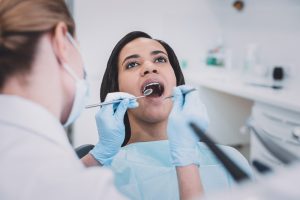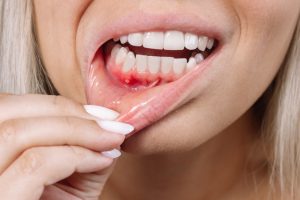Combat Gum Disease at the Center for Advanced Dentistry
Our skilled dental team in Loveland, CO, is committed to helping patients achieve and maintain healthy gums and optimal dental health. We believe that educating our patients about common dental issues and their prevention is key. Gum disease is a prevalent condition that can lead to severe oral health issues if left untreated.
From non-surgical methods to periodontal surgery, our Loveland, CO dentist tailors a personalized treatment plan for each patient’s specific needs and objectives. We are dedicated to providing outstanding care and helping patients attain a healthy, confident smile, regardless of the dental challenges they face.
If you’re experiencing gum disease, reach out to our dental team. To schedule an appointment, call our office at (970) 669-3918.
 Understanding Gum Disease
Understanding Gum Disease
Gum disease, also known as periodontal disease, affects the gums and surrounding tissues of the teeth. It results from bacterial buildup and plaque on the teeth, leading to inflammation, swelling, and infection. If untreated, gum disease can damage teeth and gums, causing tooth loss and other health issues.
Several factors influence the progression of periodontal disease, including:
- Poor oral hygiene
- Smoking
- Genetic predisposition
- Hormonal changes
- Certain medications
- Systemic diseases like diabetes
Regular dental checkups and professional cleanings are essential for detecting and treating gum disease in its early stages.
Stages of Gum Disease
Gum disease generally progresses through three stages:
- Gingivitis
- Periodontitis
- Advanced Periodontitis
Each stage of periodontal disease requires different treatment levels. Early intervention is crucial to prevent gum disease from causing further damage.
Gingivitis
Gingivitis, the earliest stage of gum disease, is marked by gum inflammation and swelling. Symptoms include redness, bleeding, and gum tenderness. Dr. Howard treats gingivitis with dental cleanings and encourages patients to maintain good oral hygiene habits at home.
Periodontitis
Periodontitis, the second stage of periodontal disease, occurs when inflammation and infection spread from the gums to the surrounding tissues and bone. Early periodontitis symptoms include receding gums, deep pockets between teeth and gums, and bone loss. Treatment for moderate periodontitis may involve scaling and root planing, antibiotics, and surgery.
 Advanced Periodontitis
Advanced Periodontitis
Advanced periodontitis is the most severe stage of gum disease, where the infection has deeply infiltrated tissues and bone. Symptoms include severe bone loss, tooth loss, and gum recession. Treatment may involve gum grafting, bone grafting, and tooth extraction.
Symptoms of Periodontal Disease
While periodontal disease can be present without noticeable gum disease symptoms, some signs may include:
- Bleeding gums
- Red, tender, swollen gums
- Gums receding from your teeth, known as gum recession
- Persistent bad breath or a bad taste in the mouth
- Pus between your teeth and gums
- Separating or loose teeth
- Changes in the way your teeth fit together when you bite
- Changes in the fit of partial dentures
Contact our Loveland, CO dentist for an appointment if you notice any gum disease symptoms. Early detection can prevent permanent complications like tooth loss.
Treatment Options for Periodontal Disease
Various treatment options are available for periodontal disease, including:
- Professional Dental Cleanings: Professional cleanings effectively remove plaque and bacteria from teeth and gums. A dental hygienist uses specialized tools to clean teeth and gums, promoting oral health.
- Scaling and Root Planing: This deep cleaning procedure removes plaque and bacteria below the gum line, typically used to treat periodontitis and prevent further damage.
- Laser Periodontal Therapy: A minimally invasive option, like LANAP, that uses laser technology to remove infected tissue and promote healing, offering an alternative to traditional gum surgery with less pain and downtime.
- Bone and Gum Grafting: Restores lost bone and gum tissue due to advanced gum disease or tooth loss. Grafts from other mouth areas or donor sources are transplanted to encourage new tissue growth.
- Antibiotics: Help eliminate bacteria causing gum disease and reduce inflammation and infection.
- Surgery: In advanced cases, surgery such as pocket reduction surgery, gum grafting, bone grafting, or tooth extraction may be necessary.
Call our Loveland, CO dental practice today to explore treatment options and learn how to prevent gum disease.
Costs of Gum Disease Treatment
Treatment costs for gum disease range from $1,700 to $8,000, depending on the disease stage. More severe gum disease typically incurs higher treatment costs.
Financing Gum Disease Treatment
At the Center for Advanced Dentistry, we believe everyone deserves a beautiful, healthy smile. That’s why we offer flexible financing options to make your dream smile achievable.
Affordable Payment Plans
Understanding that dental care can be a significant investment, we provide various affordable payment plans, including:
- Interest-Free Financing: Spread payments over time with interest-free options.
- Flexible Payment Plans: Customize payments to suit your budget.
- Insurance Plans: We accept most major insurance plans and work with providers to maximize benefits.
Simplifying the Process
Our dedicated staff assists with every step of the financial process, from insurance claims to payment plans. We’ll ensure you understand treatment costs and options, working with you to find the best solution for your needs.
Frequently Asked Questions
Yes, gum disease can be prevented by practicing good oral hygiene habits, such as brushing and flossing daily, using fluoride toothpaste, and visiting your dentist regularly for professional cleanings and checkups.
Symptoms of periodontal disease include redness, swelling, bleeding gums, and tenderness of the soft tissue. If you‘re experiencing any of these symptoms, see your dentist for an evaluation.
No, gum disease is not contagious. However, bacteria that cause gum disease can be spread through saliva, so it’s important to practice good oral hygiene habits to prevent the spread of bacteria and gum infection.
Yes, gum disease has been linked to other health problems, including heart disease, stroke, and diabetes. Maintaining good oral hygiene and treating gum disease promptly can help reduce the risk of these other health conditions and complications.
Let Us Help You Fight Gum Disease in Loveland, CO
If you’re experiencing symptoms or warning signs of gum disease or have concerns about your dental health, don’t hesitate to schedule an appointment with our Loveland, CO dentists. Our team of dental professionals is here to provide you with the care and support you need to maintain healthy teeth and gums.
Call our office at (970) 669-3918 to schedule your consultation. We welcome patients from Evans, Campion, and Garden City.

